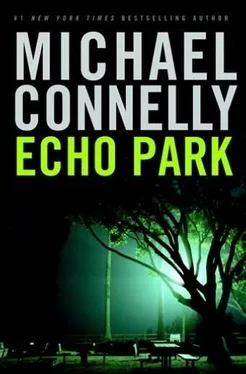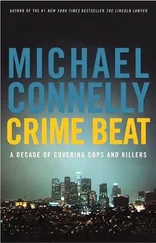The chief noticed Bosch for the first time and corrected her.
“He most certainly is,” he said in a tone that invited no disagreement.
The desk woman looked chastened. The group moved forward and Dr. Kim ushered them into an unused ER patient bay. They gathered around an empty bed.
“Chief, your officer is being-”
“Detective. She’s a detective.”
“I’m sorry. Your detective is being cared for in ICU by Drs. Patel and Worthing. I cannot interrupt their care to have them update you, so I am prepared to answer what questions you might have.”
“Fine. Is she going to make it?” the chief said bluntly.
“We think so, yes. That is really not the question. The question is about permanent damage and we won’t know that for some time. One of the bullets damaged one of the carotid arteries. The carotid delivers blood and oxygen to the brain. We don’t know at this point what the interruption of the flow was or is, and what damage might have occurred.”
“Aren’t there tests that can be conducted?”
“Yes, sir, there are and, preliminarily, we are seeing routine brain activity at this time. That is very good news so far.”
“Is she able to talk?”
“Not at this time. She was anesthetized during surgery and it is going to be several hours before she might be able to talk. Accent on ‘might.’ We won’t know what we have until late tonight or tomorrow, when she comes out of it.”
The chief nodded.
“Thank you, Dr. Kim.”
The chief started to make a move toward the opening in the curtain and everyone else turned to leave as well. Then he turned back to the head surgeon.
“Dr. Kim,” he said in a low voice. “At one time this woman worked directly for me. I don’t want to lose her.”
“We are doing our very best, Chief. We won’t lose her.”
The police chief nodded. As the group then shuffled toward the doors to the waiting room Bosch felt a hand grasp his shoulder. He turned to see that it was the chief. He pulled Bosch aside and into a private discussion.
“Detective Bosch, how are you doing?”
“I’m okay, Chief.”
“Thank you for getting her here so quickly.”
“It didn’t seem that quick at the time, and it wasn’t just me. There were a few of us. We worked together.”
“Right, yes, I know. O’Shea’s already on the news talking about carrying her out of the jungle. Making hay out of his part.”
It didn’t surprise Bosch to hear that.
“Walk with me for a moment, Detective,” the chief said.
They walked through the waiting area and out to the ambulance drive-up area. The police chief didn’t speak until they were out of the building and out of earshot of all others.
“We’re going to take a big hit for this,” he finally said. “We’ve got a goddamn admitted serial killer running around loose in the city. I want to know what happened up on that mountain, Detective. How did things go so awfully wrong?”
Bosch nodded his contrition. He knew that what had happened in Beachwood Canyon would be like a bomb detonating and sending a shock wave through the city and the department.
“That’s a good question, Chief,” he replied. “I was there but I’m not sure what happened.”
Once again, Bosch began to tell the story.
LITTLE BY LITTLE the media and the police left the ER waiting room. In a way, Kiz Rider was a disappointment because she didn’t die. If she had died, everything would have been an immediate sound bite. Get in, go live and then move on to the next spot and the next press conference. But she hung on and people couldn’t wait around. As the hours went by, the number of people in the waiting room got smaller until only Bosch was left. Rider was not currently in a relationship and her parents had left Los Angeles after the death of her sister, so there was no one but Bosch to wait for the chance to see her.
Shortly before 5 P.M. Dr. Kim came through the double doors looking for the chief of police or at least someone in uniform or above the rank of detective. He had to settle for Bosch, who stood up to receive the news.
“She’s doing well. She’s conscious, and nonverbal communication skills are good. She is not talking because of the trauma to the neck and we have her intubated, but the initial indications are all positive. No stroke, no infection, everything looks good. The other wound is stabilized and we’ll deal further with that tomorrow. She’s had enough surgery for one day.”
Bosch nodded. He felt a tremendous relief begin to flood through him. Kiz was going to make it.
“Can I see her?”
“For a few minutes, but as I said, she’s not talking at this time. Come with me.”
Bosch followed the chief surgeon once more through the double doors. They walked through the ER to the intensive care unit. Kiz was in the second room on the right. Her body seemed small in the bed, surrounded with all the equipment and monitors and tubes. Her eyes were at half-mast and showed no change when he entered her focal range. He could tell she was conscious but just barely.
“Kiz,” Bosch said. “How are ya, partner?”
He reached down and grabbed her good hand.
“Don’t try to answer. I shouldn’t have asked anything. I just wanted to see you. The chief surgeon just told me that you are going to be okay. You’ll have some rehab but then you’ll be as good as new.”
She couldn’t talk or make a sound because of the tube going down her throat. But she squeezed his hand, and Bosch took that as a positive response.
He pulled a chair over from the wall and sat down so he could keep her hand in his. Over the next half hour he said very little to her. He just held her hand and she squeezed it from time to time.
At 5:30 a nurse entered the room and told Bosch that two men had asked for him in the ER waiting room. Bosch gave Rider’s hand a final squeeze and told her he would be back in the morning.
The two men waiting for him were OIS investigators. Their names were Randolph and Osani. Randolph was the lieutenant in charge of the unit. He had been investigating cop shootings so long that he had supervised the investigations the last four times Bosch had fired his weapon.
They took him out to their car so they could speak privately. With a tape recorder on the seat next to him, he told his story, beginning with the start of his part of the investigation. Randolph and Osani asked no questions until Bosch began recounting that morning’s field trip with Waits. At that point they asked many questions obviously designed to elicit answers that went with the department’s preconceived plan for dealing with the day’s disaster. It was clear that they wanted to establish that the important decisions, if not all the decisions, came through the DA’s office and Rick O’Shea. This was not to say that the department planned to announce that the disaster should be placed at the door of O’Shea’s office. But the department was getting ready to defend itself against attack.
So when Bosch recounted the momentary disagreement over whether Waits should be uncuffed to descend the ladder, Randolph pressed him for exact quotes of what was said and by whom. Bosch knew that he was their last interview. They presumably had already talked to Cal Cafarelli, Maury Swann and O’Shea and his videographer.
“Have you looked at the video?” Bosch asked when he was finished telling his view of things.
“Not yet. We will.”
“Well, it should have everything on it. I think the guy was rolling video when the shooting started. In fact, I’d like to see that tape myself.”
“Well, to be honest, we are having a bit of a problem with that,” Randolph said. “Corvin says he must have lost the tape in the woods.”
Читать дальше












